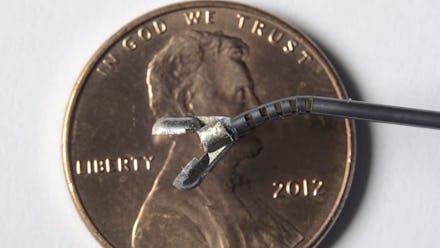This Tiny, Super-Flexible Robot Could Be the Future of Surgery

Surgeons' tools keep getting smaller and smaller.
In May, Mic wrote about the Da Vinci surgical system — a feat of engineering that let minuscule claw arms repair the skin of a grape. But a team at Vanderbilt University just built a machine that's even tinier: a "wrist" less than 1/16th of an inch thick.
What it can do: Unlike the Da Vinci, which operates on a miniaturized pulley system, the new device uses a less-complex drivetrain and drivable needles instead of clamps, meaning it can be shrunk down much more. It's so minimally invasive that its incisions can often be sealed with surgical tape, not stitching, and don't leave scars.
The wrist is made of a rigid tube cut with slots to allow mobility as well as straight sturdiness when needed. This design can dig into difficult-to-reach or delicate places like the neck, nose, throat and brain, and it can perform complicated tasks like resection, a process for removing pieces of or entire organs. That includes neurosurgery and removing hunks of cancer from the body, says Robert Webster, associate professor of mechanical engineering and lead on the tool's corresponding paper, according to the news release.
"It should be useful for a number of other operations as well," Webster said. "We think once we give this tool to surgeons they will find all kinds of applications we haven't thought of."
It's so minimally invasive that its incisions can often be sealed with surgical tape, not stitching, and won't leave scars.
The future of robot surgery: Robotic surgery tools have faced scrutiny in the past. After all, they add a degree of separation between the practitioner and the patient, which might make it hard for a doctor to notice when there's an abnormality. There have been cases of the instruments slitting blood vessels and puncturing their subjects. But the concept is still fairly new, and long is the road to any fully perfected technology. According to the Wall Street Journal, our society is a "culture that marvels at new technology ... without a lot of rigorous, standardized evaluation."
Still, the procedures made possible by this new tool are huge leaps forward in medicine. Being able to operate delicately and precisely means performing difficult surgeries on infants whose bodies may be too fragile for traditional, invasive surgeries. The Vanderbilt team may have just figured out how to save a baby's life with a robot smaller than a penny.
h/t Engadget